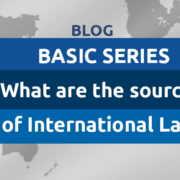What is the Contemporary International Law?
International Law is a set of fundamentals and norms elaborated for the regulation of international relations between States and other entities that, within the International Law, are recognized as subjects of Law. That international relation between subjects happens since ancient history, as its peoples kept international relations of trade, treaties, territories, etc. Hence, this week’s series intends to explain a little more about International Law in contemporary times, its fundamentals, changes, and social importance.
History of IL
A representative amount of jurists acknowledge the existence of an International Law since the Peace of Westphalia, which resulted in a series of treaties that ended with the Thirty Years’ War in 1648, between several European nations and that became a historical milestone for the contemporary nation-state. However, since Ancient times, there have been foreign relations between peoples. Since that time, the International Law has suffered many changes throughout the centuries, with different historical events that undermined and changed the world we live in today, and its traditional theories no longer can be fully applicable to the contemporary times. Therefore, the Contemporary International Law, as the name induces, represents the current state of the field.
The transition between Classical International Law and Contemporary International Law wasn’t immediate, and for some parts of the doctrine, it is still in use. Through the centuries, the need of monitoring the massive international exchange in the world due to modernization and, therefore, the easiest transactions, locomotion and global exchange of goods have been increasing – in addition to the world wars that showed the need for norms that rule the International Law. A major milestone of Contemporary times dates from the French Revolution in 1789, where it also starts, according to a representative part of the doctrine, the Contemporary International Law era. The industrial, scientific and other social revolutions, as the American, are also key elements of a new international trend.
Thus, the Contemporary International Law became increasingly necessary in the society – its value was detailed and consolidated with the creation of the League of Nations and later the United Nations (UN), an organization created with the aim to oversee and aid nations throughout the world to achieve world peace. In it, it is enforced the concept of nationality, and its fundamentals can be described as (1) on the need for legal security, which would be guaranteed by International Law, (2) the achievement of objectives and protection of values shared among international society and (3) the consensus between the particular state will of each people, understanding that the mandatory nature of International Law stems from the will of the States, together or separately – and from that arises the concept of sovereignty, fundamental for the idea of the State. Sovereignty is an absolute and perpetual power. It wouldn’t be subjected to any human power, except to the natural and divine laws.
The concept of Sovereignty
The sovereignty is, theoretically, a perpetual and absolute power in the hands of the State – its will shall be respected. That concept is of common discussion between several scholars: According to Bodin, sovereignty is an absolute and perpetual power. It wouldn’t be subjected to any human power except to the natural and divine laws, essential to the State. Rousseau, on the other hand, although he supported that sovereignty is also an essential power to the State, saw the people as supreme, and not the monarch.
Both, however, attributed the sovereignty to absolute, indivisibility, inalienability, perpetual and that cannot be relativized .
For a more progressive line of thought of indoctrinators, sovereignty would be a set of qualities that can historically change and that serve to equalize and differentiate others. It is a qualification of the will. If all States were supreme in the same way, the Public International Law wouldn’t thrive. Certain States gather qualities that make them different from the others. Thus, not all wills have the same weight, some States have the prerogative that their wills will prevail in similar conditions. That is, the concept of sovereignty would be directly linked to the political and economic power.
Contemporary International Law and Sovereignty
After the World Wars and the atrocities perpetrated, the Human Rights became more and more praised, and we start to notice a rise in the persons’ rights in relation to the power of the States. It is important to notice that, mainly after the Second World War and the creation of UN, International Law has been having an increasingly concern for Human Rights, although it is still based on the state sovereignty.
Therefore, in Contemporary International Law, Sovereignty isn’t seen as perpetual and absolute, but as a sign of the State independence to other members of the international community – having the possibility of creating its own rules, rights to have state functions in its region and independence in relation to part of the world.
The idea of modern sovereignty, however, isn’t unlimited: it must respect human rights, giving a special focus on the international scene to the rights of human beings. Nowadays, it is condemnable that the State perpetrates human rights in name of sovereignty. That concern implies limiting the State power in face of the individuals and provide minimum guarantees to the persons. It is currently being discussed the possibility of recognizing individuals in the international sphere as subjects of Law.
The fundamentals of International Law are necessary to explain the motives by which the States respect and obey them, leading to the obligatoriness of the field. Furthermore, without the appropriate justification, International Law isn’t capable of executing its basic functions, which has the objective of monitoring the international reality and create an international scene that is ideal and effective between peoples and powers around the world. In addition, Contemporary International Law is concerned with the protection of the individuals’ rights at the expense of the will of the State.







Leave a Reply
Want to join the discussion?Feel free to contribute!